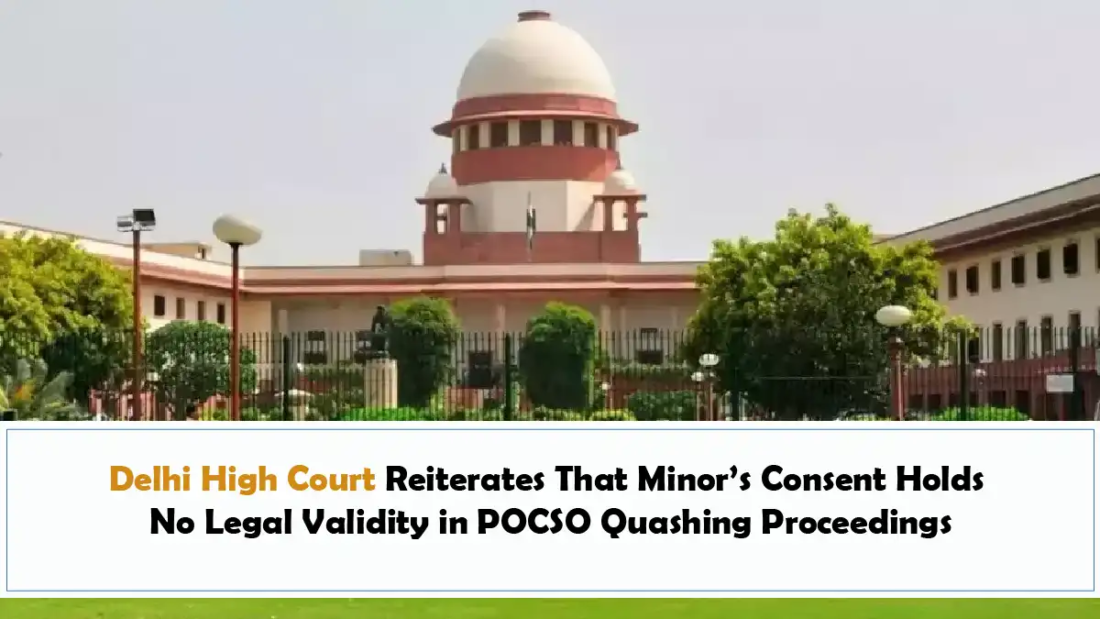Date of Order: 14 November 2025
Facts of the Case
The Delhi High Court was deciding a petition seeking quashing of FIR No. 696 of 2023 registered for offences under Section 376 IPC, Section 6 of the Protection of Children from Sexual Offences Act, 2012, and Sections 9 and 10 of the Prohibition of Child Marriage Act, 2006. The FIR stemmed from a domestic violence helpline call (181) received by the police which led to an inquiry where Petitioner No. 1 and the survivor were found cohabiting as husband and wife. They stated that the marriage had taken place with the consent of their parents. The Child Welfare Committee directed medical examination and age verification, which determined the survivor’s date of birth as 02.10.2006, confirming that she had been around 16 years and 5 months old at the time of the alleged marriage and sexual activity. The survivor’s statement under Section 164 CrPC recorded that she had voluntarily entered into the relationship and did not wish legal action to continue. At the time of the hearing, she had given birth to a child and personally appeared before the Court to affirm her desire that the proceedings be brought to an end.
Contentions of the Parties
The petitioners contended that continuing the prosecution would not serve the interests of justice because the couple was now raising a child together and the survivor herself fully supported the petitioner. It was asserted that the case did not involve any coercion or exploitation but was instead a consensual arrangement between young individuals who believed themselves to be in a genuine marital relationship. The State opposed the petition and submitted that the survivor’s minority at the relevant time attracted the strict protection of POCSO. The State argued that her willingness or marital status could not displace the statutory prohibition against sexual acts with minors and that quashing at this stage would undermine the deterrent object of the legislation.
Court’s Analysis
The Court examined the statutory framework and reiterated that POCSO institutes an absolute standard for protection of children. The survivor’s minority alone was sufficient to bring the offence within Section 6, which relates to aggravated penetrative sexual assault. The Court also noted that the survivor’s pregnancy provided clear corroboration of the occurrence of sexual activity, thereby establishing foundational facts that triggered the statutory presumptions under Sections 29 and 30.
Justice Sanjeev Narula observed that the Court was confronted with a difficult factual situation, where considerations of empathy and practical realities might favour quashing. However, the legislative policy determination regarding age of consent could not be overridden by private arrangements between parties after the fact. The Court stated that any judicial attempt to relax the statutory framework by recognizing exceptions for near majority consensual relationships would effectively amount to judicial legislation. Furthermore, the Court expressed that allowing quashing in such cases would risk signalling societal acceptance of underage marriages and normalising illicit sexual relationships involving minors, thereby weakening the enforcement of child protection laws.
Order of the Court
The High Court held that the allegations disclosed the commission of cognizable and serious offences and that the power of quashing could not be exercised in a manner that nullifies express statutory prohibitions. The petition was dismissed along with pending applications. The Court clarified that observations made were confined to consideration of the quashing request and would not prejudice the trial Court in its assessment of evidence.
Written by Adv. Aiswarya Krishnan
 Cart is empty
Cart is empty 

